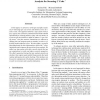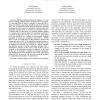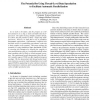114 search results - page 16 / 23 » Using likely program invariants to detect hardware errors |
125
click to vote
AICCSA
2008
IEEE
15 years 9 months ago
2008
IEEE
In this paper, we present a novel type and effect analysis for detecting type cast errors and memory errors in C source code. Our approach involves a type system with effect, regi...
109
click to vote
ISCA
2008
IEEE
15 years 8 months ago
2008
IEEE
Writing shared-memory parallel programs is error-prone. Among the concurrency errors that programmers often face are atomicity violations, which are especially challenging. They h...
114
click to vote
OSDI
2008
ACM
16 years 2 months ago
2008
ACM
Because writing computer programs is hard, computer programmers are taught to use encapsulation and modularity to hide complexity and reduce the potential for errors. Their progra...
130
Voted
ICST
2010
IEEE
15 years 27 days ago
2010
IEEE
—Mutation testing measures the adequacy of a test suite by seeding artificial defects (mutations) into a program. If a test suite fails to detect a mutation, it may also fail to...
123
click to vote
HPCA
1998
IEEE
15 years 6 months ago
1998
IEEE
As we look to the future, and the prospect of a billion transistors on a chip, it seems inevitable that microprocessors will exploit having multiple parallel threads. To achieve t...



